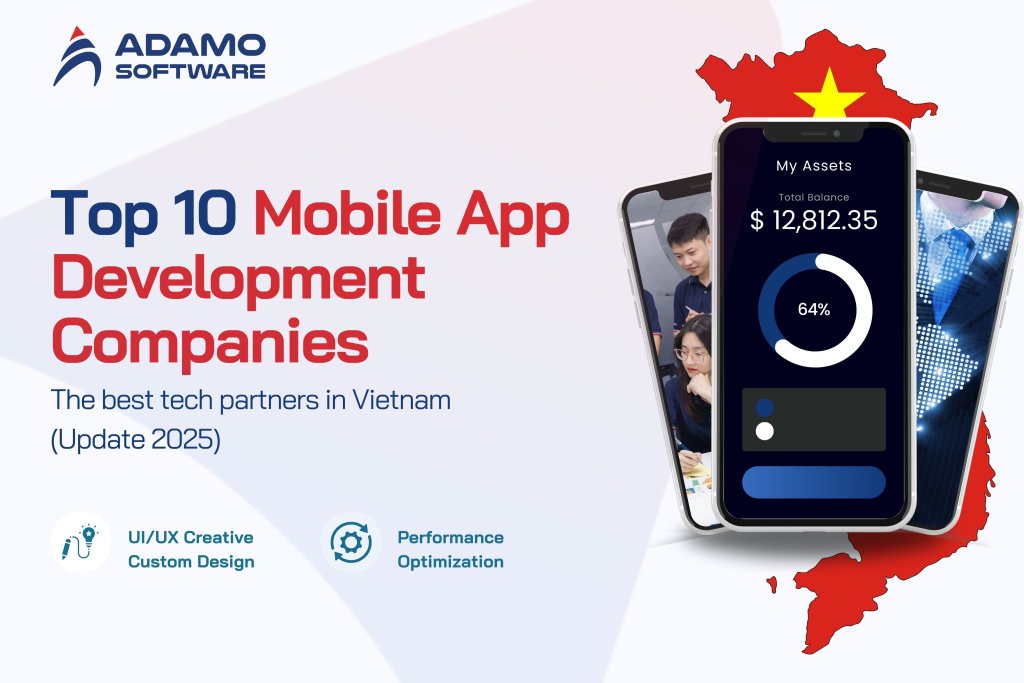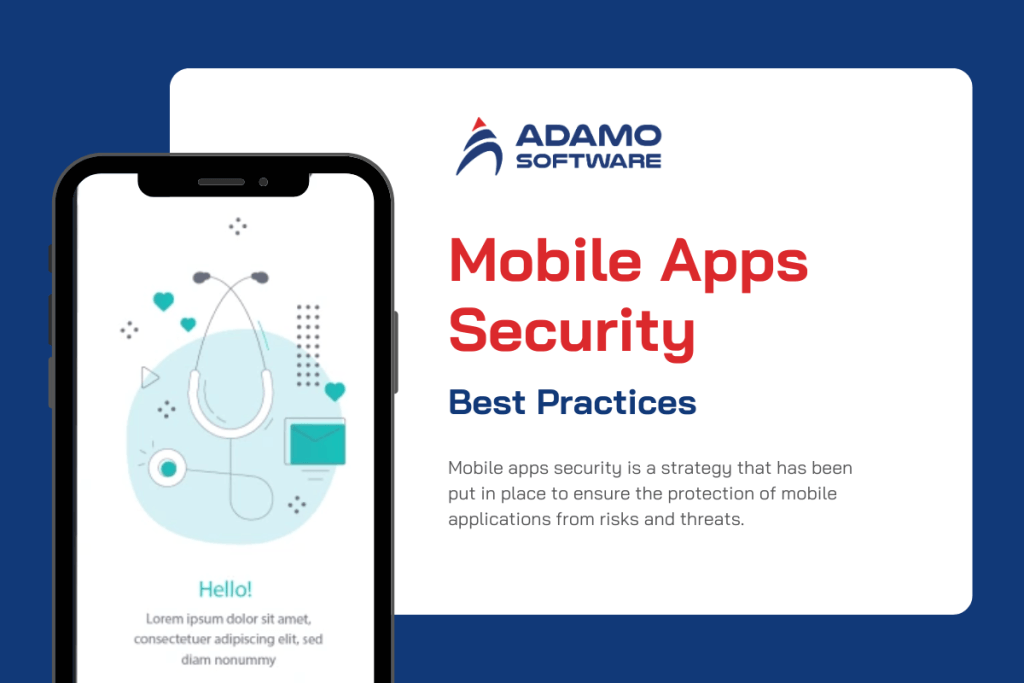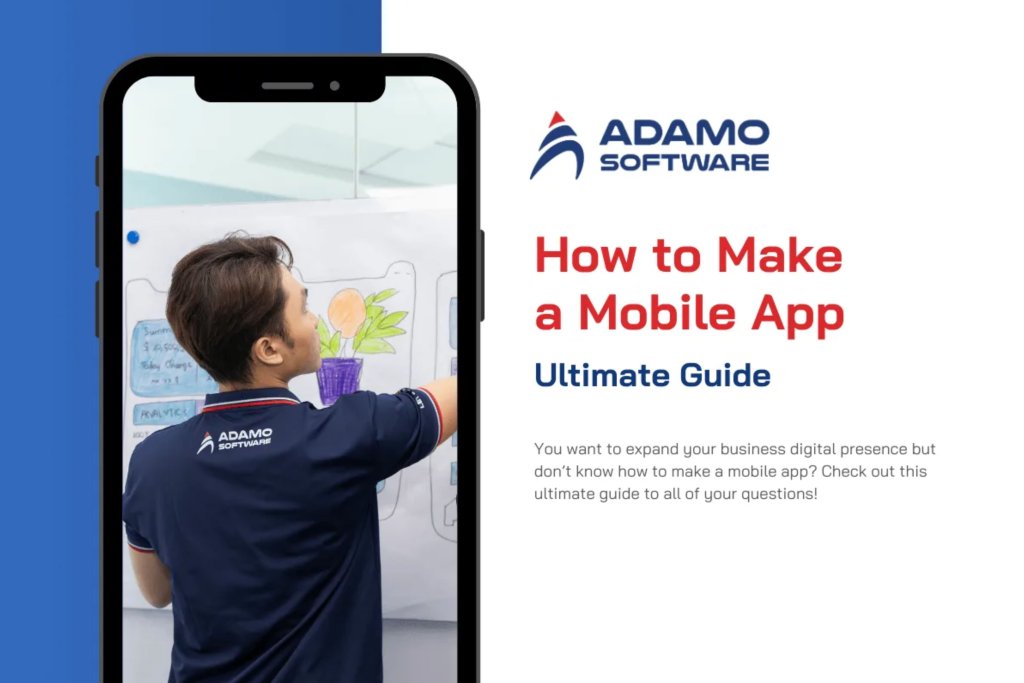7 Best Android IDE for Android Development – How to Choose
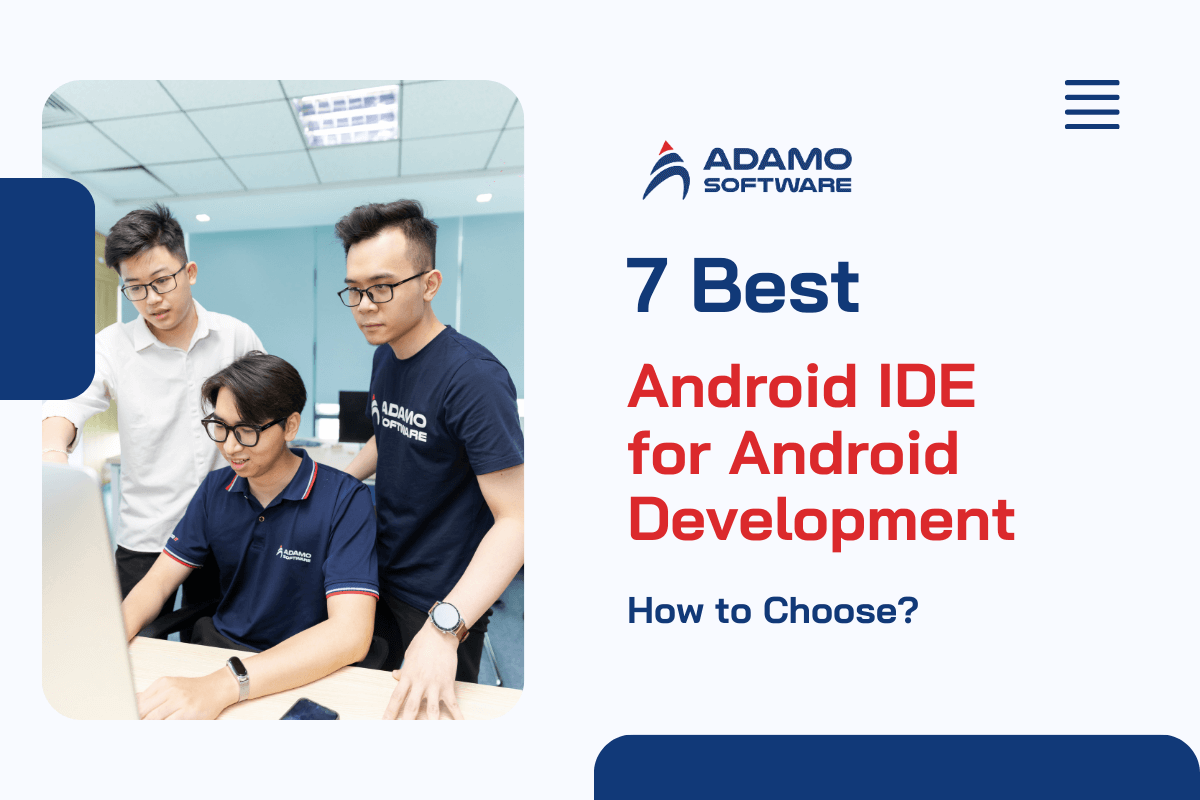
Android development presents a significant opportunity for developers, as Android stands as the most popular mobile platform worldwide. According to the latest data, Android commands a global smartphone market with a 70.69% share, while (iOS) has a 28.58% market share. With such a vast user base, selecting the right Android Integrated Development Environment (IDE) is essential for successful app creation.
Are you struggling to decide which Android IDE for Android development suits your project best? Here is a list of the top 7 Best Android IDE for Android Development. So, let’s read about our blog and discover the perfect IDE for your Android programming environment.
I. What is an IDE (Android Integrated Development Environment)
In simple words, an Android Integrated Development Environment, commonly referred to as an Android IDE for Android, is a software application that provides comprehensive facilities to programmers for software development.
Specifically designed to enhance productivity, an IDE integrates various tools and functionalities into a single cohesive environment, streamlining the entire process of writing, testing, and debugging code.
Additionally, they often offer features such as code completion, syntax highlighting, version control integration, and project management capabilities.
Android IDE for Android comes equipped with features tailored for Android programming environments, including XML layout editors, emulators or device simulators, and seamless integration with the Android SDK. They support various programming languages commonly used in Android development, such as Java, Kotlin, and C++.
II. Best Android IDE for Android Development
Selecting the right Android IDE for Android is essential for creating high-quality Android applications.
In this section, we’ll delve into the top 7 best Android IDE for Android development:
1. Android Studio
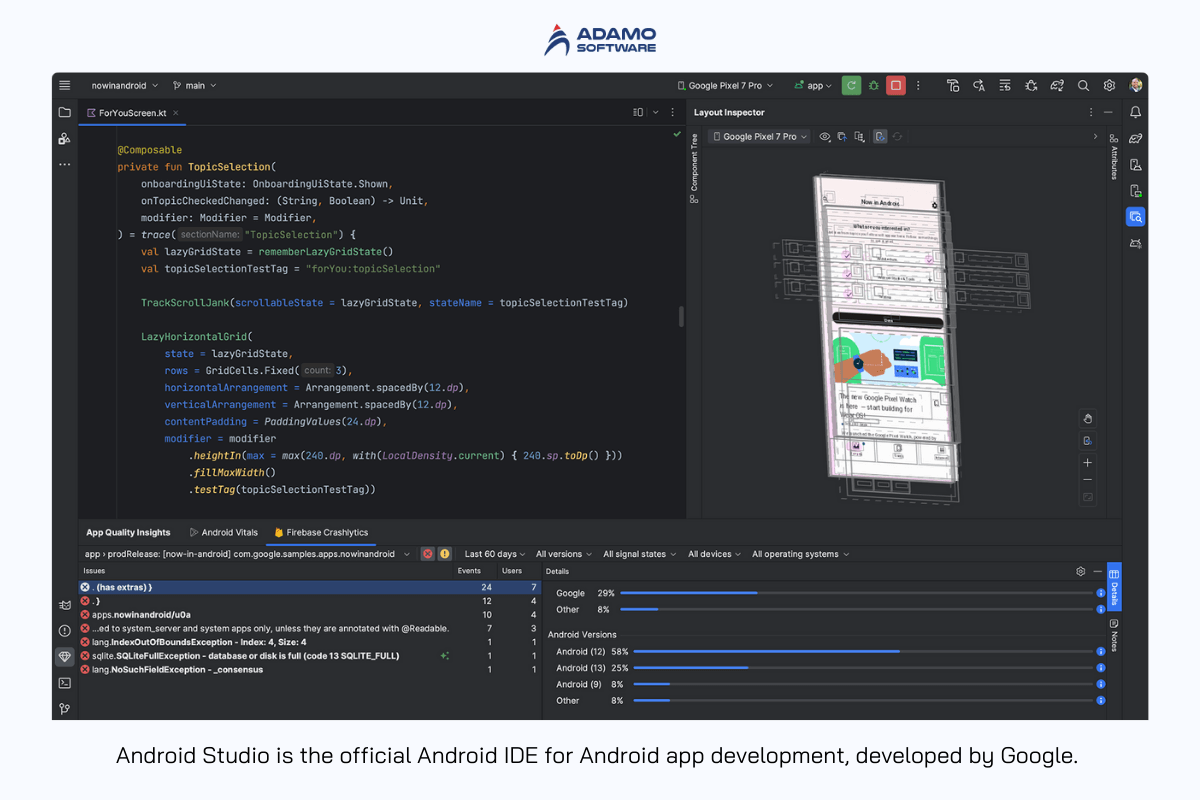
Android Studio is the official Android IDE for Android app development, developed by Google.
Android Studio offers many tools and features designed to simplify the entire app development process, from design to deployment. These include code completion, real-time error checking, and seamless debugging.
– Pros:
- Comprehensive Android-specific features.
- The versions are updated regularly, including new features and bug fixes.
- An intelligent code editor supports refactoring and advanced code completion features.
– Cons:
- It can be system resource-intensive, requiring a powerful PC.
- The learning curve for beginners.
- Sometimes slow in lower-end machines.
- Limited cross-platform development support compared to other types of IDE.
2. Visual Studio Code
Visual Studio Code (VS Code) is an Android IDE for Android with a lightweight and versatile code editor developed by Microsoft, that offers tools for debugging, testing, version control, and project management to help programming simpler.
Although VS Code is not a traditional IDE, it offers robust support for Android development through extensions and plugins.
– Pros
- Provide users with powerful programming tools.
- Compatible with different platforms.
- Effective debugging and profiling tools are available to guarantee optimal app performance.
- It provides a unified technology stack for multiple platforms.
– Cons
- The Android programming experience is lacking more than Android Studio.
- Can be complicated for beginners, especially those new to C#.
- Slower to update with the latest Android features.
- Requires a more powerful system for smooth operation.
3. IntelliJ IDEA
IntelliJ IDEA is a strong and flexible Android IDE for Android developed by JetBrains. It integrates numerous tools and functionalities crucial for Android app development.
IntelliJ IDEA simplifies the Android programming environment, establishing itself as a preferred choice among industry professionals.
– Pros
- Streamlines the development of Android apps with a comprehensive toolset.
- Enhances coding efficiency with smart code assistance.
- It is compatible with several languages.
- Supports multiple version control systems for better code management.
– Cons
- In comparison to the premium, the free version lacks several features.
- It may use a lot of resources, leading to slower performance on less powerful devices.
- Requires a machine with relatively high performance to run the IDE more smoothly.
4. Eclipse
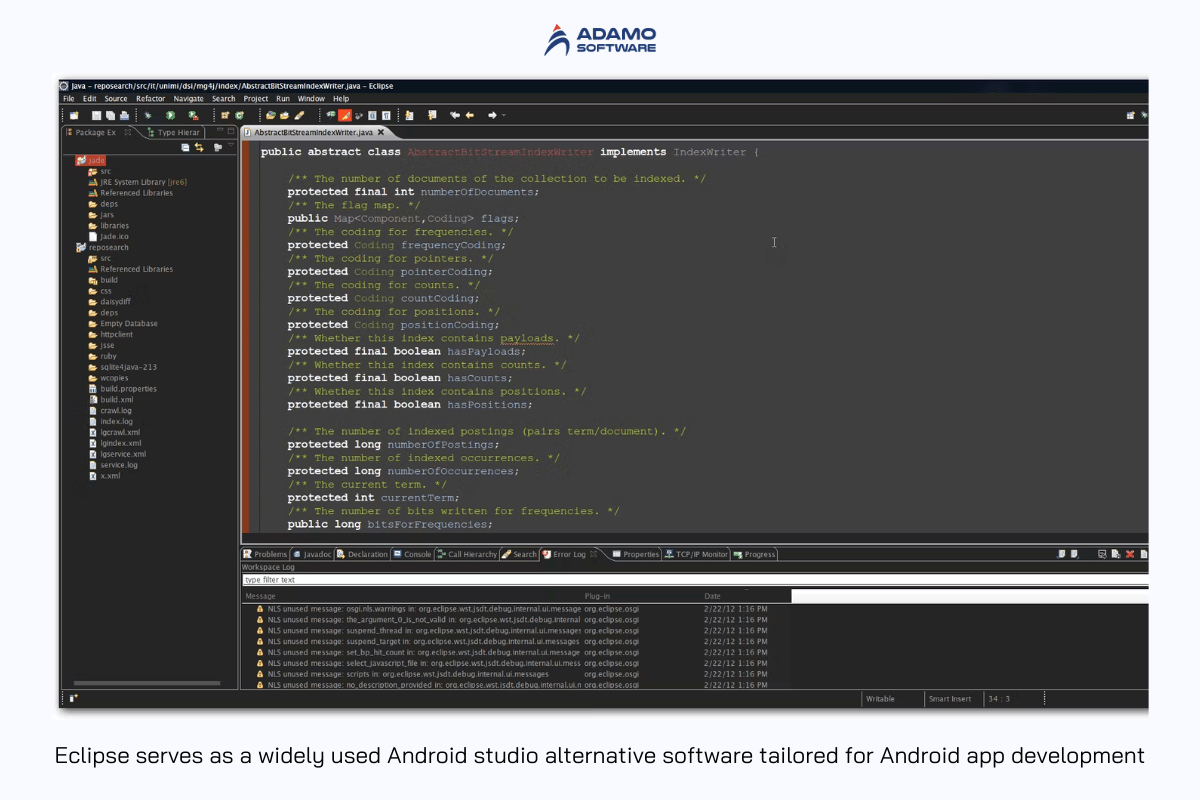
Eclipse serves as a widely used Android studio alternative software tailored for Android app development. Renowned for its extensive capabilities in building Android applications.
With a user-friendly interface and Android SDK support, Eclipse simplifies the complexity inherent in application development.
– Pros
- It may support a variety of programming languages.
- Customizable interface and workspace.
- Strong community support, providing a wealth of resources and plugins.
- It has a tool that checks syntax and completes code.
– Cons
- Not all advanced features are available.
- It can be resource-intensive, requiring a powerful system for optimal performance.
- Plugin dependency can lead to compatibility issues.
5. AIDE
AIDE allows the development of Android apps and websites directly on Android phone or tablet.
On top of its stylish visual design, it features error checking, auto code completion, real-time analysis, and refactoring.
– Pros
- Enables offline development on Android devices.
- Supports languages like Java and C++.
- With real-time error detection, developers can discover problems as they happen and improve the integrity of code.
- Assists with refactoring, simplifying the development process.
– Cons
- The user interface might be confusing compared to desktop IDEs.
- Offers fewer comprehensive features compared to other IDEs.
6. React Native IDEs
React Native, one of the Android IDE for Android, is an open-source framework developed by Facebook. It is used for Android app development.
React Native development is used to power some of the world’s leading Android apps and is considered a strong and efficient solution for the development of native mobile applications.
– Pros
- Enables cross-platform mobile app development for Android using a single codebase, reducing time and effort.
- Utilizes the JavaScript ecosystem and React library, promoting code reuse and access to a wide range of tools.
- Compiles apps to native code, ensuring native-like performance across both Android platforms.
- Supported by a large, active community with extensive Facebook resources, documentation, and a variety of third-party libraries and tools.
– Cons
- Accessing platform-specific APIs and components in React Native may pose limitations or inconsistencies.
- Learning React Native can be challenging for developers new to React.
- Handling dependencies and third-party libraries in React Native projects can be complex, with potential compatibility issues and version conflicts.
7. Unreal and Unity
Unreal and Unity are the best Android IDE for developing 3D graphic apps and games.
7.1. Unity
Unity is the most popular platform among professional game developers on the Google Play Store.
– Pros
- Free for projects generating less than $100.100 per year.
- Coverage of 25+ platforms with an intuitive interface.
- Extensive 2D game support.
- C# code is fast for development.
- Easy to learn.
– Cons
- Lower graphic quality than Unreal Engine.
- Lacks real-time multiplayer abilities.
- Lack of open-source code base.
7.2. Unreal
Unreal Engine is also recognized as one of the best Android IDE for Android development, excels in creating high-quality games for PCs and consoles. However, it is less suited for 2D development compared to Unity.
– Pros
- Free-to-use and open-source.
- Excellent 3D-realistic graphics quality.
- Popular with AAA studios.
- Faster rendering than Unity.
- Real-time multiplayer capabilities.
– Cons
- Smaller user base.
- Difficult to run on older hardware.
- Harder to learn due to C++.
- Lack of 2D abilities vs Unity.
Let’s review advantages and disadvantages of these aforementioned IDEs:
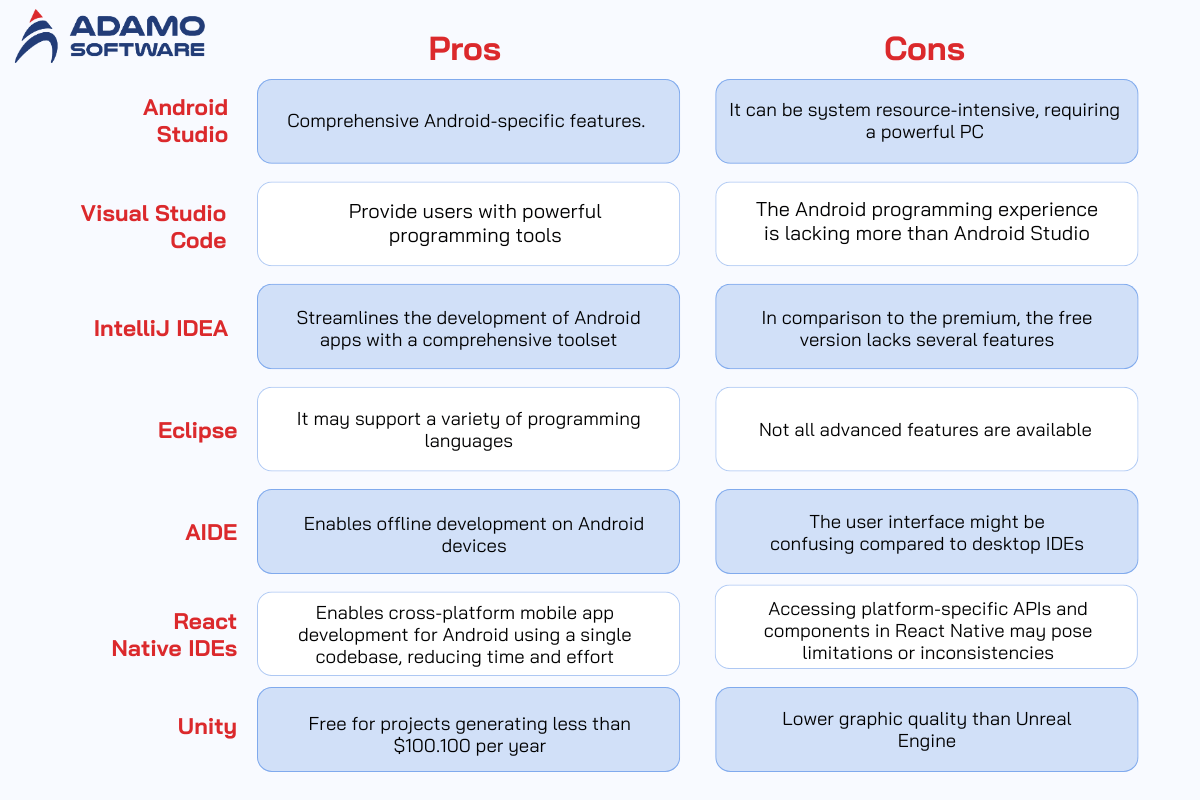
Also read: Top 7 Android mobile app development language in 2023
III. Key Criteria for Evaluating Android Integrated Development Environment
There are 6 key criteria for evaluating Android Integrated Development Environment.
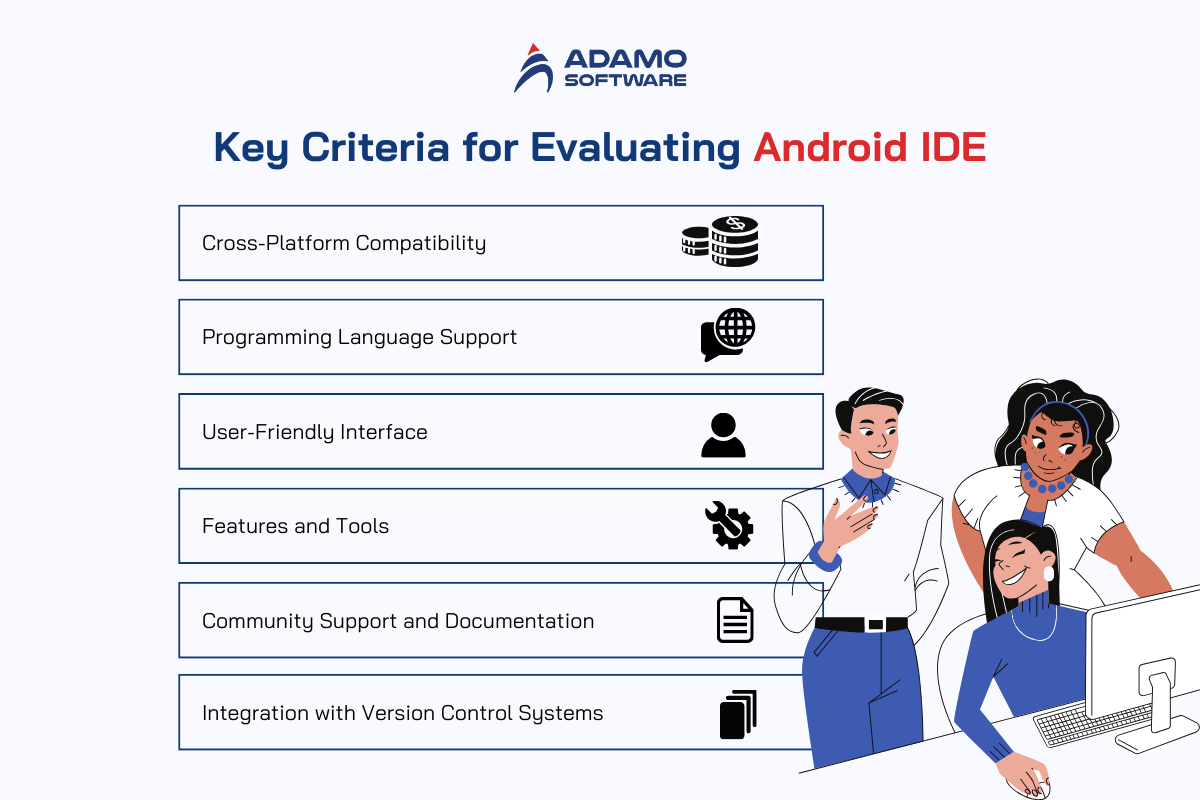
1. Cross-Platform Compatibility:
When evaluating Android IDE for Android, it’s essential to consider the platforms on which the IDEs are supported. The supported platforms can impact the accessibility and compatibility of the IDE for developers working on different systems. So, with numerous options Android IDE for Android, you should choose the most suitable one for your operating system.
1.1. Operating System Compatibility
Determine whether the Android IDE for Android is compatible with the operating system(s) used by your development team.
Most Android IDE can support cross-platform development and run on various popular operating systems. However, some Android IDEs may have limitations or provide different user experiences on certain platforms.
1.2. Hardware Requirements
Evaluate the hardware requirements of the Android IDE for Android to ensure that your development environment meets the necessary specifications.
Some IDEs may require higher system resources, such as CPU, memory, and disk space, particularly when working with large projects or resource-intensive tasks like debugging and emulation.
1.3. Mobile Device Compatibility
You should consider whether the IDE supports Android app development for various target devices. These include smartphones, tablets, watches, …
Additionally, evaluate the IDE’s compatibility with different Android versions to ensure broad coverage across the Android ecosystem.
2. Programming Language Support
Android development IDEs support multiple programming languages, with Java and Kotlin being the most widely used for Android app development.
When evaluating Android IDE for Android based on programming language support, consider the following factors:
2.1. Java Support
Java is the main programming language for Android development. Look for features like code completion, syntax highlighting, and debugging for Java, the traditional language for Android development.
2.2. Kotlin Support
With Kotlin’s rising popularity, ensure the IDE offers features such as interoperability with Java, Kotlin syntax highlighting, and support for Kotlin-specific features.
2.3. Other Languages
Consider support for additional languages like C++ for native development or JavaScript for frameworks like React Native or Flutter, based on your project needs.
3. User-Friendly Interface
User interface significantly impacts the productivity, work efficiency, and satisfaction of Android app developers.
Evaluate Android IDEs based on the following criteria:
– Intuitive Interface: Look for a clear, intuitive UI with customizable layouts, easy navigation, and context-sensitive menus.
– Accessibility Features: Ensure the IDE includes accessibility features like screen reader support, keyboard shortcuts, and high-contrast themes.
– Documentation and Tutorials: Evaluate the quality of documentation and tutorials, looking for comprehensive guides and tutorials on various aspects of Android development.
– Community and Support Forums: Check for active community support forums, online communities, and developer forums where you can seek help and share knowledge.
4. Features and Tools
The features and tools offered by an Android IDE significantly influence the developer experience and productivity.
Evaluate IDEs based on the availability and effectiveness of the following features and tools: Code editor, debugging tools, UI design tools, build and compilation tools, testing framework integration, performance profiling tools.
5. Community Support and Documentation
Community support and comprehensive documentation are one of the important factors for Android app developers.
When assessing community support and documentation, consider the following factors:
– Online Forums and Communities: Look for active communities where developers can ask questions, share knowledge, and seek assistance from peers and experts.
– Official Documentation: Evaluate the quality and comprehensiveness of the IDE’s official documentation. Look for documentation covering various aspects of the IDE’s features, tools, and workflows, as well as guides and tutorials for Android development tasks.
– Third-party Resources: Consider the availability of third-party resources such as books, tutorials, and video courses related to the IDE.
– Developer Support Channels: Assess the availability of developer support channels, such as email support, ticketing systems, and live chat support, provided by the IDE’s developers.
6. Integration with Version Control Systems
Integration with version control systems (VCS) is crucial for managing code changes and collaboration.
– Support for VCS Providers: Ensure the IDE supports popular VCS providers like GitHub, Bitbucket, and GitLab, with features for seamless repository integration and code management.
– Branching and Merging: Evaluate the IDE’s branching and merging capabilities, looking for conflict resolution tools, branch visualization, and support for strategies like feature branching.
– Code Collaboration Features: Look for features that facilitate code collaboration, such as code review tools, pull request management, and inline commenting.
– Commit History and Annotations: Assess tools for viewing commit history and code annotations, looking for features like blame annotations, commit details, and interactive history exploration.
By considering these key factors, you can choose the best Android IDE for Android development, optimizing your development process and enhancing productivity.
IV. How to Choose an Android Development IDE – Best Practices
Choosing the right Android Development (IDE) is crucial for the success of your Android development project.
Here are some best practices to consider when selecting the ideal Android development IDE:
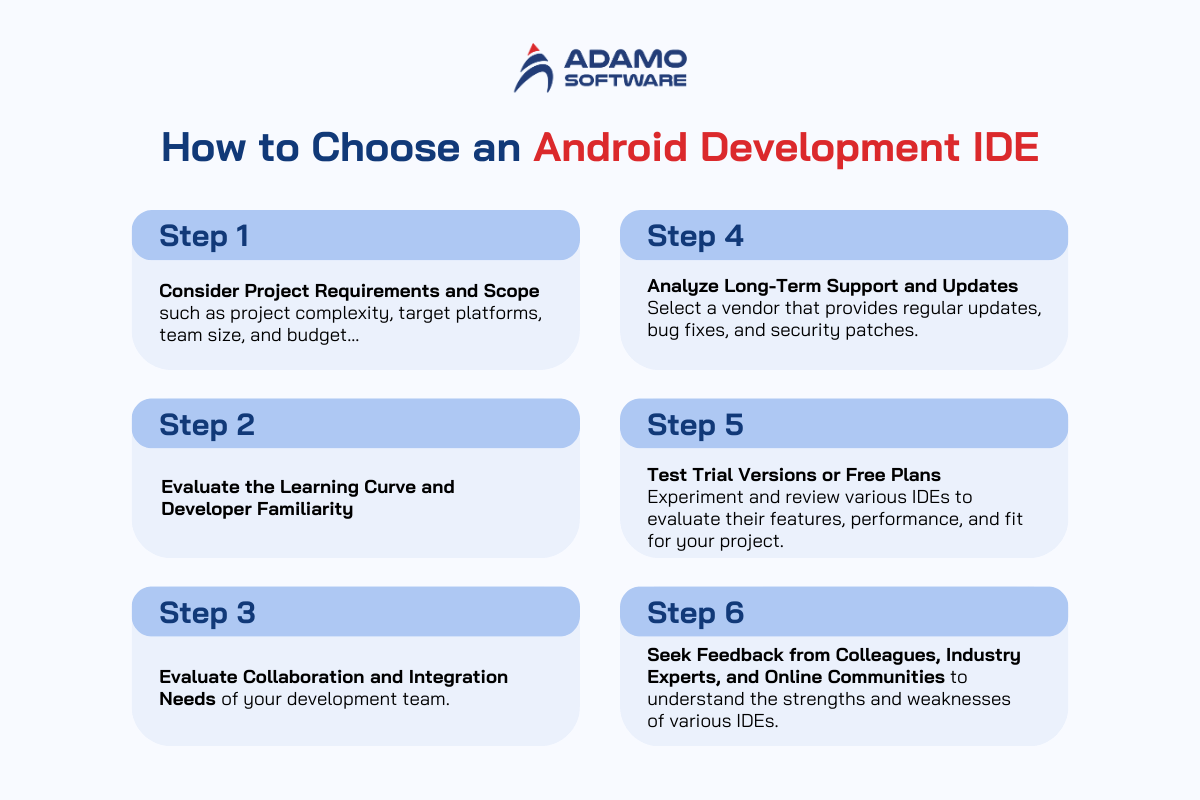
1. Consider Project Requirements and Scope
Before choosing an Android IDE for Android, thoroughly evaluate the requirements and scope of your Android development project. Such as project complexity, target platforms, team size, and budget to select an Android IDE for Android that aligns with your project’s specific needs and provides the necessary features and tools to support your development workflow.
2. Evaluate the Learning Curve and Developer Familiarity
Consider the learning curve associated with each IDE and the familiarity of your development team with the chosen platform. If your team is already proficient in a particular Android development IDE or programming language, it may be beneficial to stick with that option to minimize ramp-up time and ensure productivity.
3. Assess Team Collaboration and Integration Needs
Evaluate the collaboration and integration needs of your development team. Select an IDE that offers features for teamwork, such as version control integration, code review tools, and project-sharing functionalities. Make sure it is compatible with other tools and services used in your development process like issue trackers, continuous integration systems, and deployment platforms.
4. Analyze Long-Term Support and Updates
Consider the long-term support and update policies of each IDE vendor. Select a vendor that provides regular updates, bug fixes, and security patches to ensure the stability and security of your development environment. Additionally, consider the vendor’s track record of supporting older IDE versions and their commitment to backward compatibility.
5. Test Trial Versions or Free Plans
Before finalizing your choice, utilize trial versions or free plans provided by IDE vendors. Experiment and review various IDEs to evaluate their features, performance, and fit for your project. Consider aspects like ease of installation, configuration options, plugin availability, and overall user experience. Collect feedback from your development team to identify which IDE best suits their needs and preferences.
6. Seek Feedback from Peers and Industry Experts
Seek feedback from colleagues, industry experts, and online communities to understand the strengths and weaknesses of various IDEs. Engage in forums, user groups, and developer communities to ask questions, share experiences, and learn from others.
By following these best practices, you can make an informed decision when selecting an Android IDE for Android that best suits your project requirements, team dynamics, and long-term goals.
V. Final Thought
Choosing the right Android IDE for Android is crucial for the success of your Android app development projects. The ideal IDE can significantly streamline your workflow, enhance productivity, and ensure the creation of high-quality Android applications. By carefully considering the top best Android IDE for Android, key factors, and many best practices, you can make an informed decision that best suits your development needs.
As a premium mobile app development outsourcing company in Vietnam, Adamo Software brings extensive experience in providing offshore software development services. We help customers create cost-effective, enterprise-oriented, and innovative mobile app solutions across various fields.
Where Are You in the Mobile App Development Roadmap?
No matter where you are in your mobile app development roadmap, Adamo Software can support you in managing and accelerating your projects at any phase with confidence.
Why Choose Adamo Software’s Mobile App Development Services?

We’re offering sustainable and cost-effective mobile app development services. Our engineers have expertise in working with and using different native mobile app development services.
Besides, capturing the latest technologies in the world helps us to offer you mobile app development services across industries ranging from travel, digital healthcare, and fintech to media and entertainment.
Adamo Software delights guests through 3 main criteria:
1/Providing sustainable and improved solutions.
2/Helping businesses shorten the time needed to bring products or technology solutions to market.
3/ Help clients coordinate employees in project-based and team-based projects most flexibly and quickly.
Let us help you bring your mobile app vision to life with our service and expertise.



